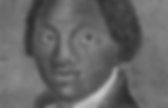

Historical Notes: The autobiography of an African slave. IN MARCH 1797 an African, Olaudah Equiano, died in England leaving an estate of about pounds 1,000.
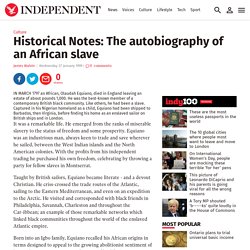
He was the best-known member of a contemporary British black community. Like others, he had been a slave. Captured in his Nigerian homeland as a child, Equiano had been shipped to Barbados, then Virginia, before finding his home as an enslaved sailor on British ships and in London. It was a remarkable life. He emerged from the ranks of miserable slavery to the status of freedom and some prosperity. Taught by British sailors, Equiano became literate - and a devout Christian. Born into an Igbo family, Equiano recalled his African origins in terms designed to appeal to the growing abolitionist sentiment of late-18th- century Britain. Equiano's autobiography was the story of a self-made, religious working man. Equiano however was unusual. His importance lies not in any precise label we choose to attach to him.
PREFACE TO EQUIANO'S BOOK. LECTURE NOTES FOR OLAUDAH EQUIANO. Equiano describes the Middle Passage as a hellish period, providing details about the horrific conditions on the slave ship that killed thousands of slaves before they reached the shores of their new home .
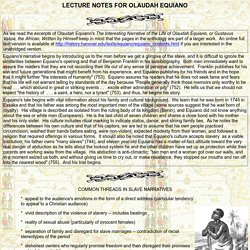
Equiano's mention of the slave woman wearing the muzzle is brief, and his reaction is straightforward ("I was much shocked and astonished . . . "), but the purpose is clear. How can a civilized audience hear of such atrocities and not be equally shocked and horrified? He mentions the daily starvation and suffering of other slaves; he speaks of dreadful punishments (men are beaten, burned, hanged, and "staked to the ground, and cut most shockingly, and then his ears cut off bit by bit" - 773).
Equiano imagines the effect of these details on his audience, and thus, he begins chapter 6 by informing the reader that he will not spend any more time detailing the torture of slaves "so frequent, and so well known . . . that it cannot any longer afford novelty to recite them" (774). Black History Month: Home. The slave who became a best selling author and abolitionist When thinking of the abolitionists of the 18th Century, there are several names that naturally come to mind – William Wilberforce, John Newton and Granville Sharp to name but a few.
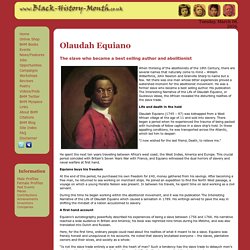
Yet there was one man whose bitter experiences proved a watershed moment for the abolitionist movement. Olaudah Equiano and abolition. Olaudah Equiano and abolition Abolitionist Olaudah Equiano (about 1745-1797) was one of the most prominent people of African heritage involved in the British debate for the abolition of the transatlantic slave trade.
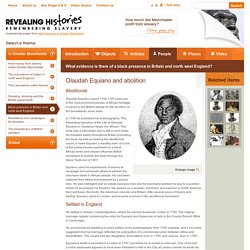
In 1789 he published his autobiography, 'The Interesting Narrative of the Life of Olaudah Equiano or Gustavus Vassa, the African'. The book was a best seller, and is still in print today. He travelled widely throughout Britain promoting the book. Equiano used his experiences of slavery to campaign and persuade others to abolish the inhumane trade in African people. Settled in England. Olaudah Equiano (c.1745-1797): The Former Slave, Seaman & Writer: The Abolition of Slavery Project.
Olaudah Equiano, was a former enslaved African, seaman and merchant who wrote an autobiography depicting the horrors of slavery and lobbied Parliament for its abolition.
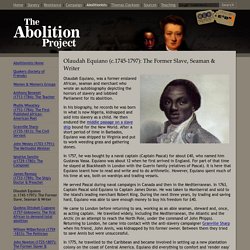
In his biography, he records he was born in what is now Nigeria, kidnapped and sold into slavery as a child. He then endured the middle passage on a slave ship bound for the New World. After a short period of time in Barbados, Equiano was shipped to Virginia and put to work weeding grass and gathering stones. In 1757, he was bought by a naval captain (Captain Pascal) for about £40, who named him Gustavas Vassa. Equiano was about 12 when he first arrived in England. He served Pascal during naval campaigns in Canada and then in the Mediterranean. He came to London before returning to sea, working as an able seaman, steward and, once, as acting captain. In 1775, he travelled to the Caribbean and became involved in setting up a new plantation colony on the coast of Central America. Equiano worked hard to promote the book. Olaudah Equiano. Olaudah Equiano was born in Essaka, an Igbo village in the kingdom of Benin (now Nigeria) in 1745.
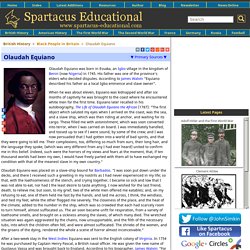
His father was one of the province's elders who decided disputes. According to James Walvin "Equiano described his father as a local Igbo eminence and slave owner". When he was about eleven, Equiano was kidnapped and after six months of captivity he was brought to the coast where he encountered white men for the first time. Equiano later recalled in his autobiography, The Life of Olaudah Equiano the African (1787): "The first object which saluted my eyes when I arrived on the coast, was the sea, and a slave ship, which was then riding at anchor, and waiting for its cargo. These filled me with astonishment, which was soon converted into terror, when I was carried on board.
Olaudah Equiano was placed on a slave-ship bound for Barbados. After a two-week stay in the West Indies Equiano was sent to the English colony of Virginia. History - Olaudah Equiano.